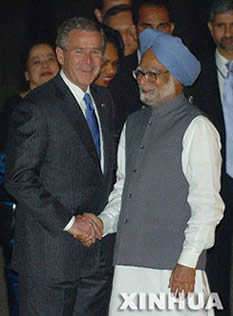-
(单词翻译:双击或拖选)
THE PRESIDENT: Good morning. I have been traveling this past week in South Asia on a trip to Afghanistan, India, and Pakistan.
My first stop was Afghanistan, and I was thrilled to see firsthand the incredible transformation1 that has taken place there. Before September the 11th, 2001, Afghanistan was ruled by a cruel regime that oppressed its people, brutalized women, and gave safe haven2 to the terrorists who attacked America.
Today, the terror camps have been shut down; women are working; boys and girls are back in school; and 25 million people have now tasted freedom. The Afghan people are building a vibrant3 young democracy that is an ally in the war on terror. And America is proud to have such a determined4 partner in the cause of freedom.
|
|
I was honored to visit our troops at Bagram Air Base who are serving on the front lines of the war on terror. It was a privilege to thank them in person for their courage and for the sacrifice of their families back home. These fine Americans are standing5 watch for liberty halfway6 across the world, and I told them that all Americans were proud of them.
The next stop on my trip was India. Like America, India has endured terrorist attacks on its own soil. Like America, India is a democracy that understands the best way to ensure peace is to advance freedom. And like America, India is working to help nations like Afghanistan build the institutions of a free and democratic society.
Relations between the United States and India have never been better. One important aspect of this partnership7 is working together to meet the energy needs of our growing economies, especially through the use of clean and safe nuclear power. On my trip, the United States and India reached an historic agreement to share civilian8 nuclear technology as India brings its civilian nuclear programs under the safeguards of the International Atomic Energy Agency. This agreement is good for American security because it will bring India's civilian nuclear program into the international nonproliferation mainstream9.
The agreement also is good for the American economy. The agreement will help meet India's surging energy needs, and that will lessen10 India's growing demand for other energy supplies and help restrain energy prices for American consumers.
Another important aspect of this partnership is the growing trade between our two countries. In the past 10 years, India has passed economic reforms that have opened its door to trade and helped raised the living standards for millions of its people. In my meetings with Prime Minister Singh, I made clear that trade between our countries must be free and fair. I know that America's workers can compete with anyone, any time, anywhere so long as the rules are fair.
Ultimately, the best way to create jobs for Americans is to expand markets for American products. Today, India is one of the fastest-growing export markets. India has now a growing middle class that is estimated at 300 million people -- more than the entire population of the United States. Middle class Indians are buying home appliances from American companies like Whirlpool. Younger Indians are enjoying McCurry meals from McDonald's. And Air India has recently ordered 68 planes from Boeing. Last year, exports to India grew by more than 30 percent. And all this trade is creating jobs and opportunity in America. So we will continue to work to level the playing field for our workers, farmers, and businesses -- and deliver a better life for all Americans.
The final stop on my trip was Pakistan, another important ally in the war on terror. After September the 11th, 2001, President Musharraf understood that he had to make a fundamental choice. He could turn a blind eye and leave his people hostage to the terrorists, or he could join the free world in fighting the terrorists.
President Musharraf made the right choice for his people, and America appreciates his leadership. Since he joined the fight against terror, President Musharraf has faced several attempts on his life, yet President Musharraf has not faltered11. He understands that the terrorists are a threat to the peace and security of the Pakistani people and the world.
Our relations with Afghanistan, India, and Pakistan will enhance the security of our country. By working with these leaders and the people of these three nations, we're seizing the opportunities this new century offers and helping12 to lay the foundations of peace and prosperity for generations to come.
 收听单词发音
收听单词发音
1
transformation

|
|
| n.变化;改造;转变 | |
参考例句: |
|
|
|
2
haven

|
|
| n.安全的地方,避难所,庇护所 | |
参考例句: |
|
|
|
3
vibrant

|
|
| adj.震颤的,响亮的,充满活力的,精力充沛的,(色彩)鲜明的 | |
参考例句: |
|
|
|
4
determined

|
|
| adj.坚定的;有决心的 | |
参考例句: |
|
|
|
5
standing

|
|
| n.持续,地位;adj.永久的,不动的,直立的,不流动的 | |
参考例句: |
|
|
|
6
halfway

|
|
| adj.中途的,不彻底的,部分的;adv.半路地,在中途,在半途 | |
参考例句: |
|
|
|
7
partnership

|
|
| n.合作关系,伙伴关系 | |
参考例句: |
|
|
|
8
civilian

|
|
| adj.平民的,民用的,民众的 | |
参考例句: |
|
|
|
9
mainstream

|
|
| n.(思想或行为的)主流;adj.主流的 | |
参考例句: |
|
|
|
10
lessen

|
|
| vt.减少,减轻;缩小 | |
参考例句: |
|
|
|
11
faltered

|
|
| (嗓音)颤抖( falter的过去式和过去分词 ); 支吾其词; 蹒跚; 摇晃 | |
参考例句: |
|
|
|
12
helping

|
|
| n.食物的一份&adj.帮助人的,辅助的 | |
参考例句: |
|
|
|


















